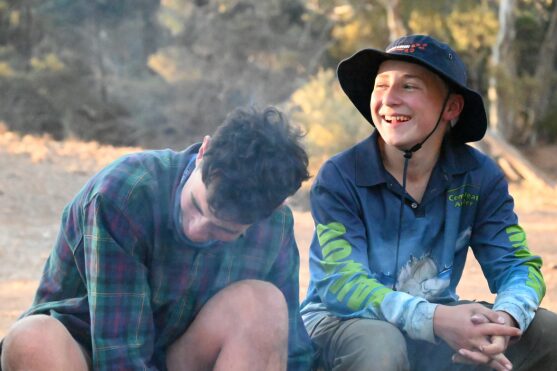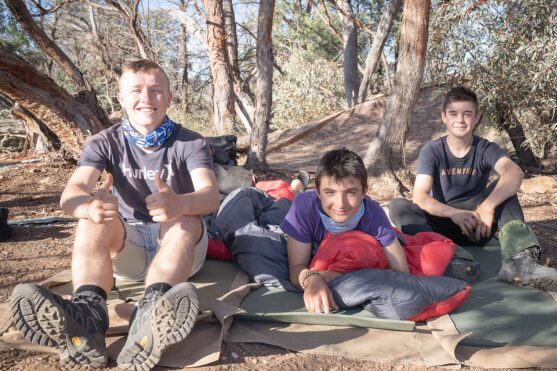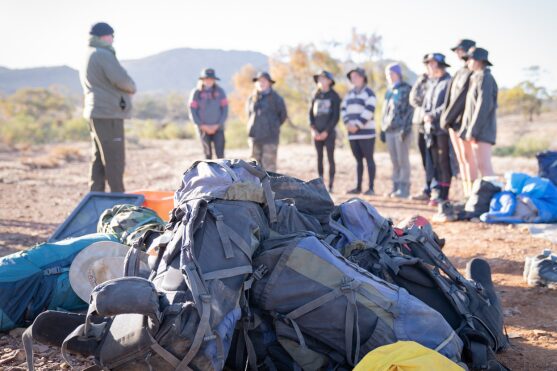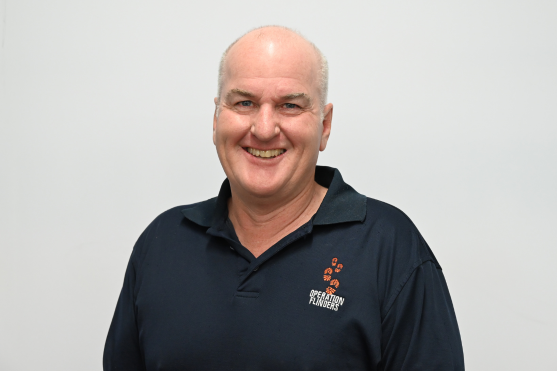Operation Flinders: ‘It’s a bit of a headspin for the kids’

There’s one on every trip, and maybe two. As disadvantaged youths from Adelaide are bussed 700km north of the city to the Flinders Ranges, made to hand over their phone and other electronic devices, and then start hiking into the wilderness, at least one of the youths will drop their backpack and run. Operation Flinders’ team leaders just smile.
This story was first published in the online edition of Inspiring Stories of Giving Volume 2 in August 2024.
This is not their first rodeo. They know it will occur to the rebellious teen pretty quickly that it’s an oppressively long way south to their usual haunts and they are surrounded by steep hills, so the path of least resistance to escape is to run along the river. By the time they work this out, they’ll find one of the team leaders sitting peacefully by the water, waiting for them.
They’ll be invited to talk about why they ran, or allowed to throw stones at trees, or scream obscenities, or just sit. Weirdly, from the youth’s point of view, they won’t get into trouble. They don’t get punished. They just have it explained that if they want dinner, they need to walk to where the first night’s camp is being set up. “It’s a bit of a headspin for the kids, ‘Going, oh, this is different, these people are different,’” said David Wark, the CEO of Operation Flinders.

The youths have found themselves on the bus after being recommended by their school or maybe their family. They’re there because they’ve been struggling with peers or authority, broken homes and fraught family relationships. They may be drifting into brushes with the law. “They might have been exposed to some social environments that would be ‘uncomfortable’ would be the nicest way I could say it,” David said.
These are the youths who find their world altered by eight days hiking in the Flinders Ranges on Yankaninna Station. During their stay, they will walk through amazing country, share chores and spend time with team leaders who treat them with respect and trust, and genuinely listen to them, which can unlock these young people.
Having just clocked up the 10,000th attendee, it’s a system that has been proven to work, driven by philanthropy, such as ongoing support from the James & Diana Ramsay Foundation since 2011. The support has included funds for capacity building and infrastructure, so other fundraising can go straight into the programs themselves.
The foundation’s executive director, Kerry deLorme, said: “One of the Foundation’s funding pillars is supporting young people, and I have visited Yankaninna Station a number of times and have seen the impact that Operation Flinders is making on these young and vulnerable people.

“We have invested a significant amount of money in infrastructure at the property, but there’s nothing like being up there with the kids sitting around the campfire having conversations with them. We see their eyes light up when they have adults around them believing in them and encouraging them that they have the power to change their lives for the better and to improve their relationships, with both family and school.”
Only eight days to potentially change a young person’s life? David said that it was transformative for the attendees to spend time without the pressure of social media or the intrusion of mobile phones, and out of their everyday environment. Instead, they are embedded in a place of broad horizons, ever changing light and rugged beauty, sitting around campfires at night, which he described as “the elixir of truth” for the flames’ ability to get young people to talk in ways they don’t normally.

They also have the realisation that they’ve been given shoes that fit and are comfortable, or that they can sleep safely, without the danger of somebody doing anything inappropriate. “There are kids that are really upset when they have to leave because this is the first time that they’ve ever been able to talk to an adult and feel good about who they are. Plus, they’re getting three meals a day and just some of that basic stuff,” David said.
“We’re hoping that the work that we do sees them rely on each other and work together. And that it has the attendees making decisions very quickly that are positive and may lead to much better outcomes – be that seeking employment, knuckling down at school, respecting their peers and respecting authority, or be that contributing to family life in a positive way,” he said.
Operation Flinders runs a follow-up program, Next Step, for those who choose to participate, back in Adelaide, and David said the large numbers of participants shows how the young people don’t want to let go of what they have gained from the Flinders experience.
Kerry spoke of one of those, Ellie Lawrence-Wood, who was one of the first attendees in 1993, when she was 13 and was already using and selling hard drugs among other disruptive behaviour. With Operation Flinders’ support, Ellie enrolled in a TAFE course, continued on to university where she excelled in psychology, earning a PhD. She is now a psychologist specialising in post-traumatic stress disorder, and a board member of Operation Flinders. All from going for a walk.